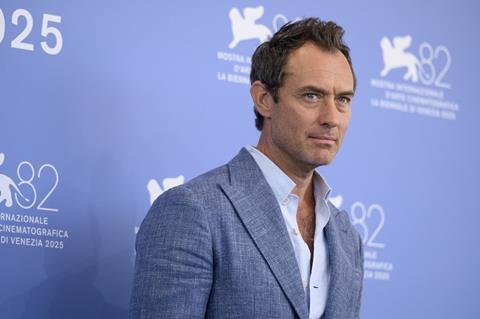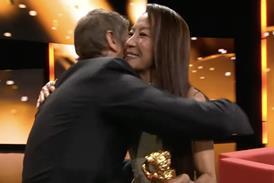
Jude Law says there was a danger of becoming “obsessive” in researching his role as Vladimir Putin in Olivier Assayas’s Venice Competition title The Wizard of the Kremlin.
“There was a lot of footage one could watch,” said Law at the press conference for the film, which has its world premiere this afternoon on the Lido. “When I start going down that rabbit hole, it becomes obsessive; you’re looking for more, newer material.”
“The tricky side to me was the public face [of Putin] we see gives very little away,” continued Law, who referenced a nickname of Putin’s, ‘the man with no face’. “Olivier would want me to portray this or that emotion - I felt that conflict of trying to show very little but feel an awful lot from within was the key.”
Law said “everything” about playing the Russian president during his rise to power “was a revelation because I knew very little about him, so he became a subject to learn more and more about. It’s about the rebuilding of the sense of self, after a huge humiliation. That was key not just to the broader picture we were portraying.”
The Wizard of the Kremlin is based on Giuliano Da Empoli’s 2022 novel of the same name, in which a young Russian filmmaker becomes an advisor to KGB spy Vladimir Putin as the latter rises towards power in post-Soviet Russia through the 1990s and 2000s.
Paul Dano leads the cast as the fictional filmmaker Vadim Baranov, with Law as Putin, Alicia Vikander, Tom Sturridge, Will Keen and Jeffrey Wright also on the cast.
Repercussions
Law said he “didn’t fear repercussions” in taking on the role. “I felt confident in the hands of Olivier Assayas and the script,” said the actor. “This was a story that was going to be told intelligently. We weren’t looking for controversy for controversy’s sake. It’s a character within a much broader story – we weren’t trying to define anything about anyone.”
Assayas hopes the film relates to the current political climate. “The film is about how modern politics were invented,” said the French filmmaker. “Part of that evil raised from the rise to power of Vladimir Putin in Russia. We made a movie about what politics has become and the very scary, dangerous situation we all feel we are in. We took the story of Putin but it applies to a lot of authoritarian leaders. It’s more generally about the transformation of politics.”
“What’s going on right now is not only terrifying, but is even more terrifying by the fact we haven’t found the answer,” said Assayas. “I haven’t seen a relevant reaction to that emerging.”
Vikander plays Ksenia, partner to Baranov, and acknowledged that “this is a story about a lot of men talking in rooms.”
“Olivier told me we needed a female counterpart, but also a very moral one as well,” said Vikander. “She is the one who becomes a mirror for Baranov, for him to face his own decisions and moral responsibility.”
Also on the press conference panel, Da Empoli discussed his book in the context of the ongoing Russian invasion of Ukraine. “Even if it was written before and refers to a period that’s way before, it was somehow talking about what was the root of Putin’s power,” said Da Empoli. “And there would be a root of violence from the beginning. Everything that came after was somehow the logical consequence of that root. That’s why it’s still relevant today three years later.”
Wright suggested that the film is important for US audiences to see, given what he perceives as his homeland’s drift towards autocracy. “We had an idea we could be better, that we could aspire towards some kind of utopian perfectability [in the US],” said Wright. “If that is lost - as it is now - then we become the thing we see in this film. That was part of the research or me, was understanding why this story needs to be told now, and why it needs to be told and seen in America.”
Olivier Delbosc produced the film for Curiosa Films with Sidonie Dumas for Gaumont, which also handles sales.

























No comments yet